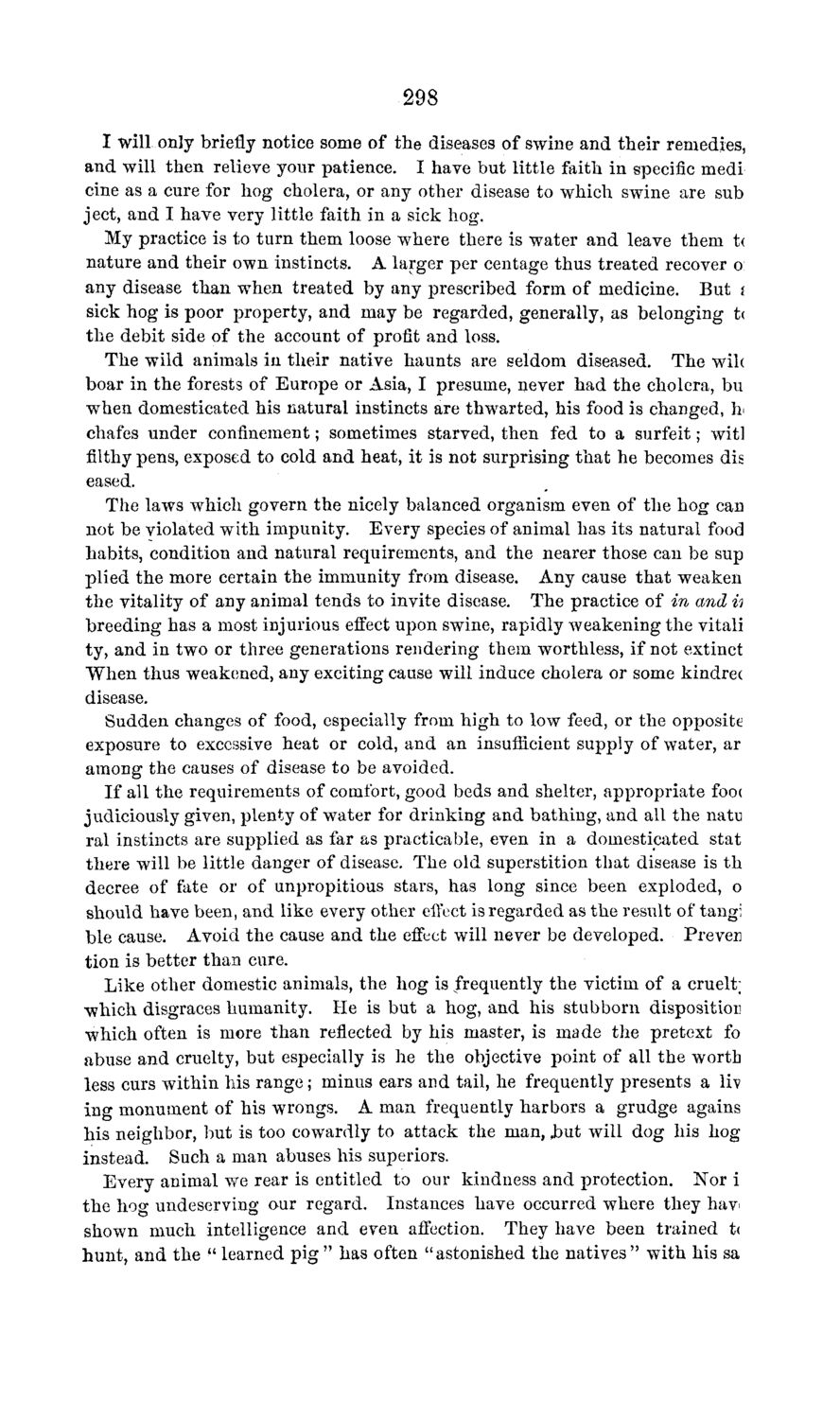| |
| |
Caption: Board of Trustees Minutes - 1869
This is a reduced-resolution page image for fast online browsing.

EXTRACTED TEXT FROM PAGE:
298 I will only briefly notice some of the diseases of swine and their remedies, and will then relieve your patience. I have but little faith in specific medi cine as a cure for hog cholera, or any other disease to which swine are sub ject, and I have very little faith in a sick hog. My practice is to turn them loose where there is water and leave them t( nature and their own instincts. A larger per centage thus treated recover o any disease than when treated by any prescribed form of medicine. But * sick hog is poor property, and may be regarded, generally, as belonging t( t h e debit side of the account of profit and loss. The wild animals in their native haunts are seldom diseased. The wile boar in the forests of Europe or Asia, I presume, never had the cholera, bu when domesticated his natural instincts are thwarted, his food is changed, In chafes under confinement; sometimes starved, then fed to a surfeit; wit] filthy pens, exposed to cold and heat, it is not surprising t h a t he becomes dis eased. The laws which govern the nicely balanced organism even of the hog can not be violated with impunity. Every species of animal has its natural food habits, condition and natural requirements, and the nearer those can be sup plied the more certain the immunity from disease. Any cause t h a t weaken the vitality of any animal tends to invite disease. The practice of in and ii breeding has a most injurious effect upon swine, rapidly weakening the vitali ty, and in two or three generations rendering them worthless, if not extinct When thus weakened, any exciting cause will induce cholera or some kindre( disease. Sudden changes of food, especially from high to low feed, or the opposite exposure to excessive heat or cold, and an insufficient supply of water, ar among the causes of disease to be avoided. If all the requirements of comfort, good beds and shelter, appropriate foo< judiciously given, plenty of water for drinking and bathing, and all the nati] ral instincts are supplied as far as practicable, even in a domesticated stat there will be little danger of disease. The old superstition that disease is t h decree of fate or of unpropitious stars, has long since been exploded, o should have been, and like every other effect is regarded as the result of tangi ble cause. Avoid the cause and the effect will never be developed. Preveu tion is better than cure. Like other domestic animals, the hog is frequently the victim of a cruelt; which disgraces humanity. He is but a hog, and his stubborn disposition which often is more t h a n reflected by his master, is made the pretext fo abuse and cruelty, but especially is he the objective point of all the worth less curs within his r a n g e ; minus ears and tail, he frequently presents a liv ing monument of his wrongs. A man frequently harbors a grudge agains his neighbor, but is too cowardly to attack the man, ,but will dog his hog instead. Such a man abuses his superiors. Every animal we rear is entitled to our kindness and protection. Nor i the hog undeserving our regard. Instances have occurred where they h a v shown much intelligence and even affection. They have been trained t< hunt, and the " learned p i g " has often "astonished the n a t i v e s " with his sa
| |